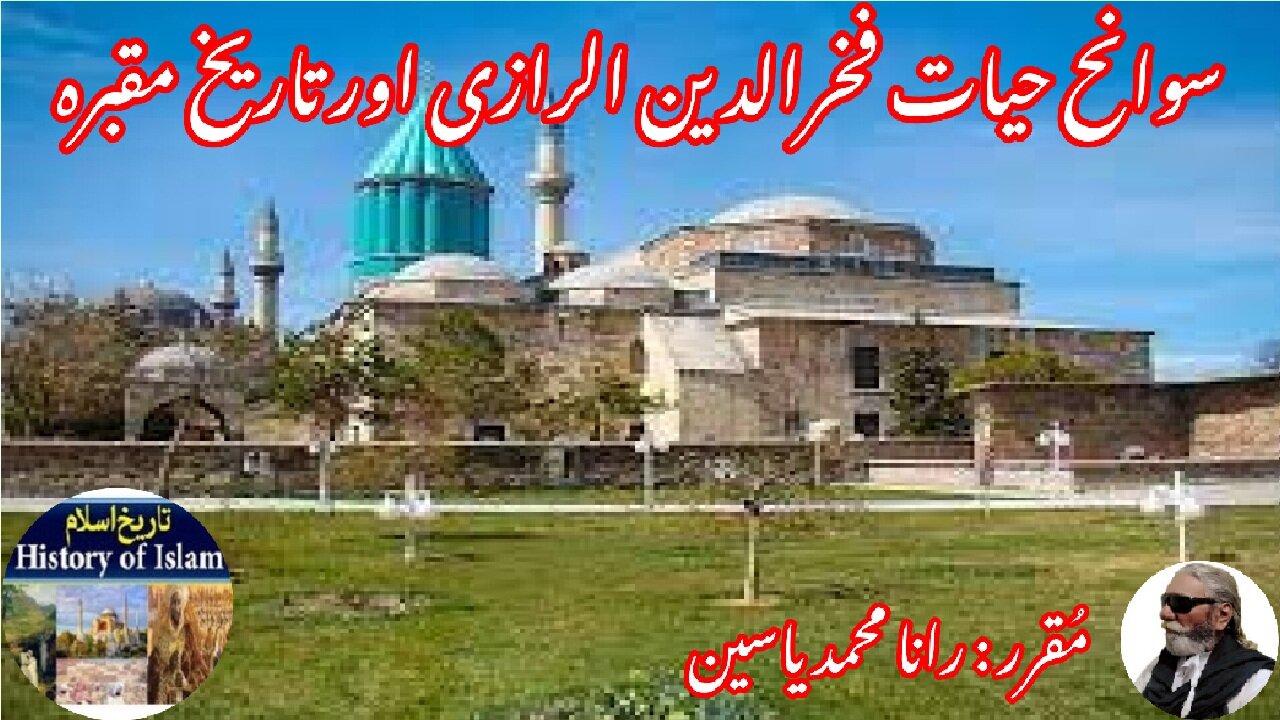Premium Only Content

19Fakhr al-Din al-Razi फ़ख़्र अल-दीन अल-रज़ी فخر الدین الرازی کی سوانح عمری اور ان کے مزار کی تاریخ۔
@islamichistory813 #sufisaint #culturalheritage #biography #fakhraldin #alrazi #sobriquetsultan #islamicmysticism #islamicphilosophy #shrine #historicalfigures
Biography of Fakhr al-Din al-Razi and the history of his shrine.
Dekhti Aankhooon aur sountay kaanoon ko Asslamoalaikum, sisters, brothers friends and elders, in informative series videos of Islamic ascolars, sufisaints, cultural heritages, islamic philosophys, islamic mysticisms and historical figures. today we are describing biography of Fakhr al-Din al-Razi and the history of his shrine.
Fakhr al-Din al-Razi often known by the sobriquet Sultan of the Theologians, was an influential Iranian and Muslim polymath, scientist and one of the pioneers of inductive logic. He wrote various works in the fields of medicine, chemistry, physics, astronomy, cosmology, literature, theology, ontology, philosophy, history and jurisprudence. He was one of the earliest proponents and skeptics that came up with the concept of multiverse, and compared it with the astronomical teachings of Quran. A rejector of the geocentric model and the Aristotelian notions of a single universe revolving around a single world, al-Razi argued about the existence of the outer space beyond the known world.
Al-Razi was born in Ray, Iran, and died in Herat, Afghanistan. He left a very rich corpus of philosophical and theological works that reveals influence from the works of Avicenna, Abu'l-Barakat al-Baghdadi and al-Ghazali. Two of his works titled Mabahith al-mashriqiyya (Eastern Studies in Metaphysics and Physics) and al-Matalib al-Aliya (The Higher Issues) are usually regarded as his most important philosophical works.
Fakhr al-Din al-Razi, whose full name was Abu ?Abd Allah Mu?ammad was born in 1149 or 1150 CE (543 or 544 AH) in Ray (close to modern Tehran), whence his nisba al-Razi. According to Ibn al-Sha ar al-Maw?ili, one of al-Razi's earliest biographers, his great-grandfather had been a rich merchant in Mecca. Either his great-grandfather or his grandfather migrated from Mecca to Tabaristan (a mountainous region located on the Caspian coast of northern Iran) in the 11th century, and some time after that the family settled in Ray. Having been born into a family of Meccan origin, al-Razi claimed descent from the first caliph Abu Bakr, and was known by medieval biographers as al-Qurash? (a member of the Quraysh, the tribe of the prophet Muhammad to which also Abu Bakr belonged). However, it is not clear from which precise lines of descent al-Razi envisioned his purported ties with Abu Bakr to result, and the poet Ibn ?Unayn (died 1233) actually praised him as a descendant of the second caliph Umar ibn al-Khattab.
Fakhr al-Din first studied with his father, ?iya al-Din al-Makki, himself a scholar of some repute whose magnum opus in kalam has recently been rediscovered in part, and later at Merv and Maragheh, where he was one of the pupils of Majd al-Din al-Jili, who in turn had been a disciple of al-Ghazali. He was a leading proponent of the Ash'ari school of theology.
His commentary on the Quran was the most-varied and many-sided of all extant works of the kind, comprising most of the material of importance that had previously appeared. He devoted himself to a wide range of studies and is said to have expended a large fortune on experiments in alchemy. He taught at Ray (Central Iran) and Ghazni (eastern Afghanistan), and became head of the university founded by Mohammed ibn Tukush at Herat (western Afghanistan).
In his later years, he also showed interest in mysticism, though this never formed a significant part of his thought. He died in Herat (Afghanistan) in 1209 (606 AH), where his tomb is still venerated today. Many believe he was poisoned by the Karramiyah.
One of Imam Razi's outstanding achievements was his unique interpretive work on the Quran called Maf?ti? al-Ghayb (Keys to the Unseen) and later nicknamed Tafs?r al-Kab?r (The Great Commentary), one reason being that it was 32 volumes in length. This work contains much of philosophical interest. One of his "major concerns was the self-sufficiency of the intellect." His "acknowledgment of the primacy of the Qur'an grew with his years." Al-Razi's rationalism undoubtedly "holds an important place in the debate in the Islamic tradition on the harmonization of reason and revelation.
Fakhr al-Din al-Razi passed away in 1209 CE, a few months before the Mongol invasions of the Islamic world would begin reshaping the political and cultural landscape of the Middle East. His death took place in the city of Herat, which was then part of the Khwarezmian Empire (modern-day Afghanistan). Herat, known for its rich intellectual and cultural environment, was an important city during al-Razi’s time, and it is where he spent the latter part of his life, continuing his scholarly work. The exact date of his death is not precisely recorded, but most sources indicate it occurred in 1209, marking the end of a prolific intellectual career.
At the time of his death, Fakhr al-Din al-Razi was regarded as one of the most authoritative scholars in the Muslim world. His works were highly respected not only in Sunni circles but also across various Islamic sects, including the Shia, who acknowledged his intellectual prowess. Al-Razi’s ability to merge reason with religious faith, and his extensive contributions to both theological and philosophical discourses, had left a lasting mark on Islamic scholarship.
After his death, Fakhr al-Din al-Razi was buried in the city of Herat, where he had spent his final years. His tomb, which is located in the city’s historical cemetery, has become a place of respect and reverence for scholars, students, and admirers of his work. Over the centuries, the shrine of Fakhr al-Din al-Razi in Herat has served as a symbol of intellectual achievement, with many visitors coming to pay their respects to one of Islam’s greatest polymaths.
Herat, a city that was once a cultural and intellectual hub, has witnessed numerous transformations throughout history. As the city became part of various empires and dynasties, including the Timurid Empire, the shrine of Fakhr al-Din al-Razi has undergone several phases of restoration and reconstruction. The modern-day shrine, while not as grand as some of the other historical monuments in the region, continues to be an important site for those who wish to honor al-Razi’s memory and his contributions to Islamic scholarship.
The shrine of Fakhr al-Din al-Razi, like many tombs and memorials of revered scholars, was likely constructed and maintained by later generations of his followers, students, and intellectual heirs who wished to preserve his legacy. There is no definitive record of the exact individuals or rulers who built the shrine. However, it is plausible that it was initiated and renovated by the Timurid dynasty in the 15th century, as Herat was one of the prominent cities in the Timurid Empire, and rulers like Shah Rukh and his successors were known for their patronage of scholars and the preservation of historical and intellectual sites.
The construction and expansion of shrines dedicated to great scholars were common in the Islamic world, particularly during times when Islamic civilization flourished under strong political and cultural rulers. It is likely that al-Razi's tomb was initially a simple burial site, which was later developed into a more prominent shrine as his intellectual influence grew.
In modern times, the shrine of Fakhr al-Din al-Razi in Herat continues to be an important cultural and historical landmark. Despite the challenges posed by the turbulent history of the region, including wars and invasions, efforts have been made to preserve the shrine as part of the city's intellectual heritage. Visitors and scholars alike continue to pay tribute to Fakhr al-Din al-Razi’s contributions, and his tomb stands as a testament to the enduring legacy of one of the Islamic world's greatest thinkers.
With that allow us until tomorrow, tomorrow we will be described biography of Islamic Scholar Sufi Sanit Fariduddin Masud Ganjshakar and the history of his shrine.
==========================================
-
 LIVE
LIVE
hambinooo
1 hour agoPUBG DOMINATION
71 watching -
 1:03:06
1:03:06
The Rubin Report
3 hours ago‘Piers Morgan’ Goes Off the Rails as 'TYT' Host Attacks Dave with Nasty Insults
47.3K78 -
 1:47:50
1:47:50
Steven Crowder
4 hours agoLWC Christmas Special 2024 | Giving Back with Santa Crowder
124K320 -
 LIVE
LIVE
The Dana Show with Dana Loesch
2 hours agoTRUMP SLAMS SPENDING DEAL | The Dana Show LIVE On Rumble!
675 watching -
 35:43
35:43
Grant Stinchfield
2 hours ago $1.27 earnedThe C.R. in One Page, Anything Longer is the Deep State Exposed
19.6K3 -
 23:06
23:06
The Shannon Joy Show
5 hours ago🔥🔥Live EXCLUSIVE W/ Patrick Wood On Drones, Bitcoin, Artificial Intelligence & The Technocracy🔥🔥
17.6K2 -
 2:19:25
2:19:25
Matt Kohrs
13 hours agoMarket Chaos || The MK Show
71K5 -
 32:38
32:38
Rethinking the Dollar
2 hours agoDebt Ceiling Drama: What Trump Wants Now | Morning Check-In
11.4K5 -
 2:02:10
2:02:10
LFA TV
15 hours agoDING DONG THE BILL IS DEAD! | LIVE FROM AMERICA 12.19.24 11am EST
44.8K24 -
 37:31
37:31
BonginoReport
7 hours agoShut It Down (Ep.108) - 12/19/2024
117K288